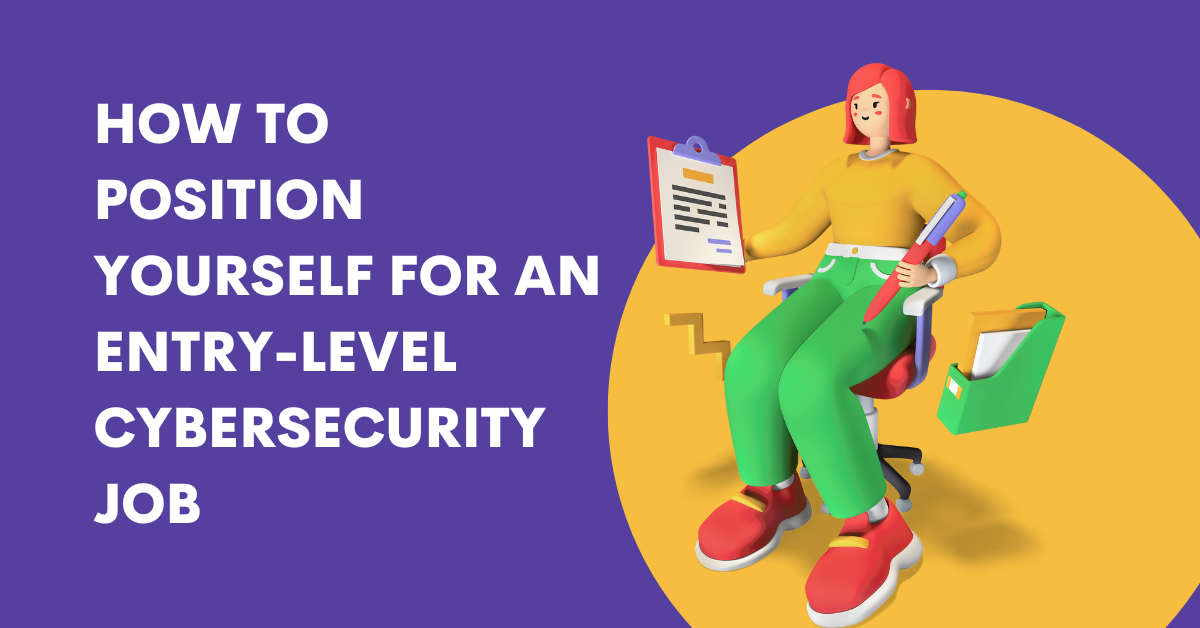In this post, you will learn how to position yourself for an entry-level cybersecurity job.
Cybersecurity is a primary concern on everyone’s agenda nowadays, even if they are not business owners or large-scale investors. As the use of the internet is widespread globally and necessary for daily life tasks, data protection has taken on a whole other meaning for both private individuals and full-fledged companies.
Therefore, the cybersecurity industry is fast growing and ever in need of talented hackers to dismantle malware attacks, data analysis experts, and those who specialize in data protection and online security.
Table of Contents
The Basics Of Entry-Level Cybersecurity Jobs
Cybersecurity is a booming business, and therefore, securing an entry-level job is not as challenging as other professions. You can get hired at a commercial, governmental, or even non-governmental organization, and you could also start with a paid or unpaid internship and work your way up to a junior-level position.
It is worthwhile to note that many cybersecurity positions actually do not require formal expertise or qualification, and many entry-level jobs will provide valuable on-the-job training that can kick-start your career.
If you have completed your undergraduate, you are already on a solid footing to seek out a job in cybersecurity at the junior level. Use services like Higher Hire to look for relevant jobs in your area or in the city you’re moving to if you are planning to make a change from your hometown.
Types Of Cybersecurity Jobs To Look Out For
Cybersecurity has a number of specializations that fall under it, and even if you are seeking to be trained, you are likely to have to choose an area of expertise at some point.
Here are the types of skills and subsequent jobs you can expect at the entry-level:
- Security Intelligence – this is a job involving a lot of data processing and analysis at every turn. Security intelligent experts or information security officers are constantly analyzing mountains of data and its portals for loopholes that a potential enemy hacker could utilize to gain access. Penetration testing may also be part of their job if they have the necessary knowledge. Most of the data processing is done in real-time so gaps can be identified and optimal security can be maintained at all times.
- Systems Engineering – this type of job involves anticipating malware and hacker attacks and attempts. Systems engineers review an organization’s system and try to prevent malware or firewall destruction from happening, and they help ensure the smooth running of daily business operations. They may also be keepers of essential codes and data but at a more senior level.
- Risk Analysis of Cybersecurity- as the name suggests, risk analysts make forecasts of reigning viruses and malware that could potentially threaten a company, and they are also instrumental in protecting information assets such as intellectual property, accounts, files, and even hardware like computers and drives that store these. The PCI DSS compliance checklist, which is required from all card companies and online payment portals as a safety measure, is also managed by this personnel.
How To Position Yourself For An Entry-Level Cybersecurity Job: Frequently Asked Questions
Breaking into the exciting world of cybersecurity can be challenging, but with the proper preparation and knowledge, you can stand out from the crowd and land your dream entry-level job.
Here are answers to frequently asked questions to help you on your journey:
What skills and qualifications do I need for an entry-level cybersecurity job?
While specific requirements vary depending on the company and role, some core skills and qualifications are generally sought after:
- Technical skills:
- Basic understanding of networking concepts (TCP/IP, OSI model)
- Familiarity with operating systems (Windows, Linux)
- Knowledge of security fundamentals (encryption, authentication, authorization)
- Scripting experience (Python, Bash)
- Soft skills:
- Communication and problem-solving abilities
- Critical thinking and analytical skills
- Teamwork and collaboration
- Adaptability and willingness to learn
READ ALSO: Top Entry-Level Jobs in 2026: Career Paths with the Fastest Growth and Best Starting Salaries
I don’t have a cybersecurity degree. Is it possible to get an entry-level job?
Absolutely! While a degree can be beneficial, it’s not always a requirement, especially for entry-level positions. Demonstrating your genuine interest and initiative through other means can be equally valuable:
- Certifications: Earning industry-recognized certifications like CompTIA Security+ or Security Fundamentals validates your knowledge and commitment.
- Online courses and boot camps: Numerous online resources and boot camps offer intensive training in cybersecurity concepts and practical skills.
- Personal projects: Showcase your skills and passion by building personal projects like security tools or participating in ethical hacking challenges.
- Internships and volunteer work: Gain valuable experience and network with professionals by volunteering at IT security organizations or securing internships.
What resources can help me prepare for job interviews?
Several resources can equip you for success in your job interview:
- Mock interviews: Practice with friends, family, or career counsellors to hone your communication and answer common interview questions.
- Online resources: Websites like Glassdoor and Indeed offer company-specific interview questions and insights.
- Cybersecurity communities: Online forums and communities like Reddit’s r/cybersecurity can provide valuable advice and support.
- Professional organizations: Engage with organizations like (ISC)² or National Cyber Security Alliance (NCSA) for career guidance and resources.
What are some common mistakes to avoid during my job search?
Here are some pitfalls to keep in mind:
- Applying for jobs you’re not qualified for: Tailor your resume and cover letter to highlight relevant skills and experience for each specific position.
- Having a weak online presence: Ensure your social media profiles and online presence reflect your professionalism and commitment to cybersecurity.
- Lacking enthusiasm and passion: Be prepared to articulate your genuine interest in cybersecurity and your reasons for pursuing this career path.
- Giving up quickly: The job search can be competitive, so stay persistent, network actively, and learn from each experience.
Remember, landing your first cybersecurity job may require dedication and effort, but with the right skills, preparation, and a proactive approach, you can unlock a rewarding career in this dynamic field. Good luck!
A Final Word
Although there are many entry-level cybersecurity jobs, getting into the field can be daunting. The best way to get started is by doing a simple Google search for “cybersecurity job openings”, and local listings will be shown. From there, you can narrow down your search by level, skillset, and geographical location.
Once you have a few options in front of you, you can start applying for jobs, including internships and paid positions. If you’re having trouble finding a job you want, you can always make a lateral move or build a freelance business that offers similar services.
The road to an entry-level cybersecurity job will be long and hard to navigate, especially if you don’t have any relevant experience or qualifications.
You will need to prove yourself many times over along the way and it is also essential that you have a supportive network of friends, family members, and colleagues to bounce ideas off of as you go. However, if you persevere, you will find success and work towards a cybersecurity career you love.
INTERESTING POSTS
- 3 Things You Need To Know About Cloud Backup In 2022
- How To Get A Cybersecurity Job With No Experience
- Is Online Cyber Security Training Worth It?
- 7 Cybersecurity Jobs In Demand At Today’s Enterprises
- Integrating Security Awareness Training Into Employee Onboarding
- A Brief Introduction To The Security Guard Job Position
- Skillhub’s Experts Reveal: Here Are 7 Things You Must Have
About the Author:
Meet Angela Daniel, an esteemed cybersecurity expert and the Associate Editor at SecureBlitz. With a profound understanding of the digital security landscape, Angela is dedicated to sharing her wealth of knowledge with readers. Her insightful articles delve into the intricacies of cybersecurity, offering a beacon of understanding in the ever-evolving realm of online safety.
Angela's expertise is grounded in a passion for staying at the forefront of emerging threats and protective measures. Her commitment to empowering individuals and organizations with the tools and insights to safeguard their digital presence is unwavering.









